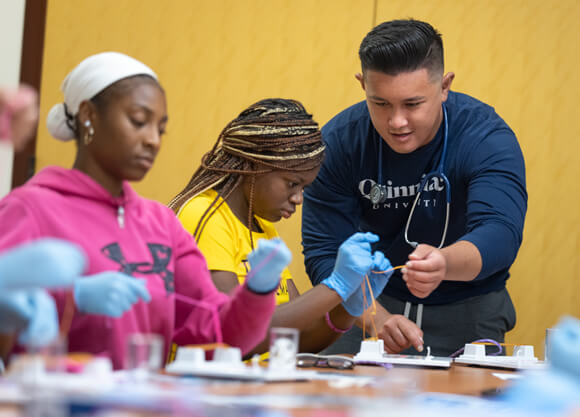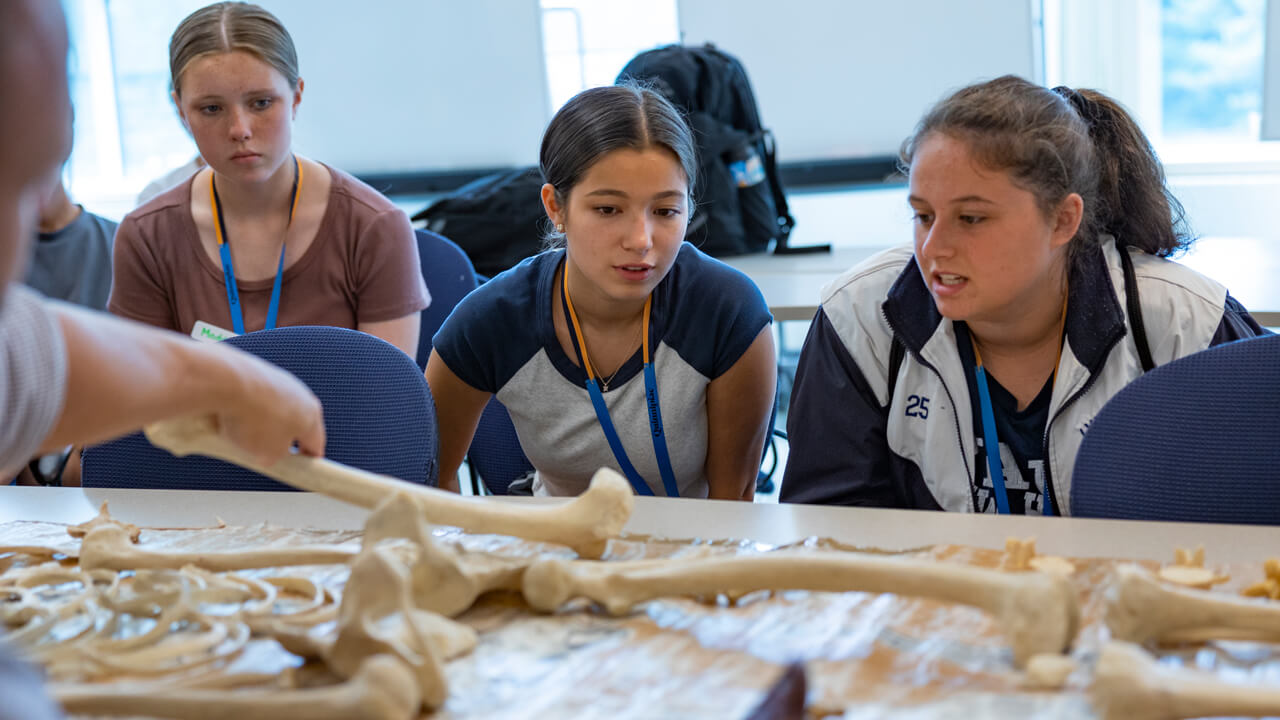First Year of High School
Get to know your interests
Begin to think about what areas of interest you are drawn to. Make sure your schedule includes courses in similar areas and add in some elective courses to meet your interests.
Start to visit colleges and universities
Visit a few local colleges and universities to get a feel for what you like (for instance: large versus small campuses; city versus suburban schools).
-
Tip: Start a journal dedicated just to college visits. Every time you visit a college, whether for a tour, or simply attend a summer camp, take a few minutes to write down your top likes and dislikes for each university. It'll be a great reference in a couple of years to refresh your memory on how you felt about the college.
Begin to think about your resume
Look at admission requirements for the universities you are interested in. Now is a good time to begin to build your high school resume to meet some of those requirements.
Sophomore Year of High School
Deepen your experiences in your areas of interest
Explore different careers in the subjects you are interested in by taking academic courses that complement the fields you are interested in and attending summer experiences focused on these specialties.
-
Tip: You may want to apply to work in jobs or volunteer opportunities that are in fields that interest you. For instance, if you are interested in education, working as a camp counselor or after-school tutor may help you prepare. Or if you are interested in healthcare, you may be able to sign up for a volunteer position at your local hospital or healthcare facility.
Visit colleges and universities in person
Visit more colleges and universities that appeal to you and connect with admissions counselors at each college. Counselors can help you understand the admission process, provide answers to your questions and send you valuable information.
Take the PSAT
Take the PSAT. College Board has lots of information about the tests.
Junior Year of High School
Plan to take the SAT
Why take the SAT, even if it's not required at the school your applying for? It is a strong indicator that you're ready for college-level courses, and it can make your application stronger and more well-rounded. You only need to send your best scores to college, so it's a good idea to take it more than once.
Start to make a more specific plan based on your personal goals
Make a list of colleges and universities that are of particular interest to you and begin researching their specific admission requirements, programs of interest, tuition and financial aid.
-
Tip: Take a look at the curriculum pages for your programs of interest and consider adding in additional courses or electives to your high school schedule that complement the subjects you plan to study.
-
Tip: Check with your guidance counselor for leads on colleges they recommend visiting.
Research scholarship and financial aid opportunities
Inquire about financial aid, scholarships and grants. Your high school counselor can help you with this piece. You may also check with the universities you are applying to for more information.
Look to see what scholarships we offer at Quinnipiac
-
Tip: Most scholarships have deadlines early in your senior year of high school, so it's a good idea to start looking into scholarships that you might qualify for and mark your calendar for those deadlines. Also, don't disregard scholarships with lower amounts. Usually those are less competitive, and those awards can add up quickly if you apply for a few. Take a look at some of our scholarship search information and advice.
Parents or guardian(s) should be sure to file their federal taxes because this is the year tax information will be used to complete the Free Application for Federal Student Aid (FAFSA) in your senior year. Also, be sure to check your credit score. If it isn’t where you would like it to be, take action to improve it, if possible. If you plan to co-sign an educational loan for your student to assist with financing their education, your credit score may influence your offered interest rate. Improving your credit score now could mean big savings in interest later.
Visit, visit, visit
Brochures and websites can only tell you so much. That feeling of "fit" often comes mainly from visiting the campus for yourself and picturing yourself doing what you love in an inspiring environment.
Schedule a tour or plan to attend an Open House at Quinnipiac
If you can't make it in person, be sure to check out online tour videos or virtual tours.
Explore Quinnipiac's virtual tours and videos
-
Tip: Consider making a weekend out of visiting a handful of colleges with a buddy. Whether it's a parent, mentor or friend, sometimes having someone with you can help reduce some nerves you may be feeling. Don't forget your journal you started!
Senior Year of High School
You made it to the grand finale!
This year can be one of the most stressful, but if you have a good plan, it can also be the most exciting. We encourage you to try to live in the moment and cherish these last days in high school as you cross the finish line of the admission process.
Consider re-taking the SAT
You may want to retake the SAT in the fall. Your scores can make your application stronger and more well-rounded. You only need to send your best scores to college, so it's a good idea to take it more than once.
Apply for admission
Fill out the Common App early to be sure to meet deadlines for the colleges for which you want to apply. It opens on August 1.
Make a financial aid and scholarship plan — and complete the FAFSA
Every student who thinks they will need any form of financial aid should complete the online FAFSA (Free Application for Federal Student Aid form). It's free to complete.
-
List Quinnipiac’s school code (001402), so we can receive the results to create your financial aid offer.
-
Double-check your Social Security Number to make sure it is correct before submitting.
-
Quinnipiac offers virtual sessions to help families complete their FAFSA. Check our financial aid website for announcements each fall.
-
Some schools require additional financial aid forms, such as the CSS Profile. QU only requires the FAFSA.
-
FAFSA uses tax information from two years prior to your college entry year.
Merit Scholarships
Apply for scholarships and grants. Often colleges will automatically consider you for merit scholarships. These scholarships reduce your tuition to attend the school and does not need to be repaid. Quinnipiac offers up to $34,000 in grants and scholarship aid and approximately 92% of students receive financial aid.
Research Outside Scholarship Opportunities
In addition, you can apply for scholarships through local and national groups and organizations. Check with your parent or guardian(s)’ employer, community foundations, high school guidance office and state agencies.
We’ve compiled some of the best search engines and resources for you
Make Sure to Ask for Help
Your high school counselor can help you with the financial aid process. If your high school offers a financial aid information session, try to attend. Include your parents and family members in the process because they'll be able to help you access the types of documents you'll need.
Ask questions! Financial aid processes and jargon can be confusing and vary from one school to another. Our financial aid staff can help, even if you do not know where to begin. Contact us at finaid@qu.edu or 203-582-8750 with any questions you may have along the way.
Check your application status
Confirm the colleges you are applying to have received all your materials. Most universities have application portals where you can check the status of your application.
Enjoy the moment!
Receiving an acceptance letter — or a few — is a big moment! Enjoy it! You earned it.
Take the time to really consider your options when your acceptance letters come in.
Visit again
Once you've received your acceptance notifications, be sure to attend the admitted student events. It's a great way to get to know the university better, meet more of the professors, connect with the financial aid counselors and ask any more questions you may have. Once you commit to your university, let the other schools know that you are not accepting their offer.
Finish strong
Stay focused on your studies. Colleges may want to see your final transcript, so make sure you finish strong.
Congratulations and enjoy your senior year! Soak up the memories, and get ready to make new ones. Watch out for communications from your new college letting you know next steps for transitioning into college life. Begin to connect with your new classmates on social media platforms, and at accepted student and orientation events.
Don't hesitate to reach out to high school counselor and college admission counselors directly. These professionals are here to help make the process as clear as possible.











